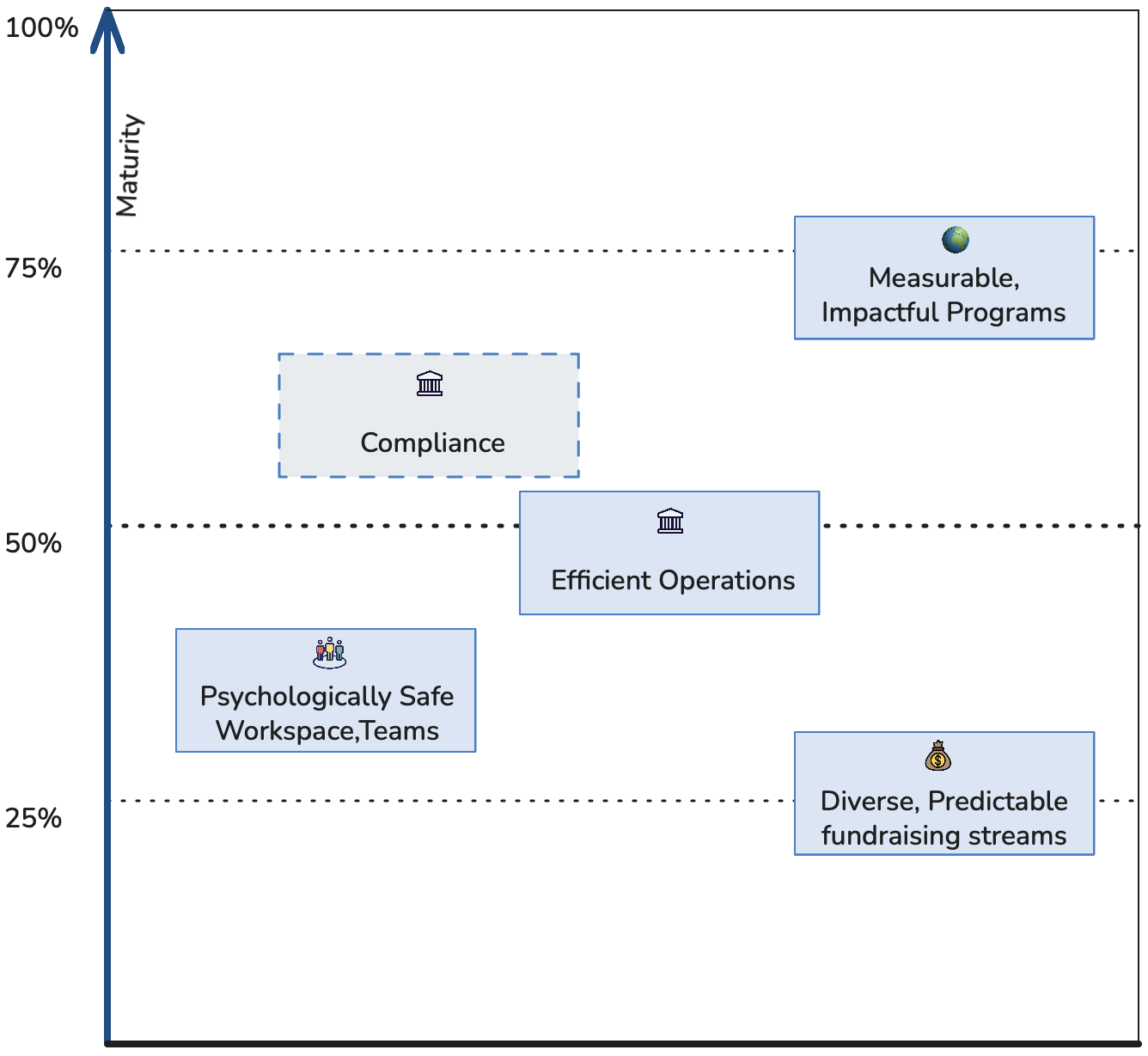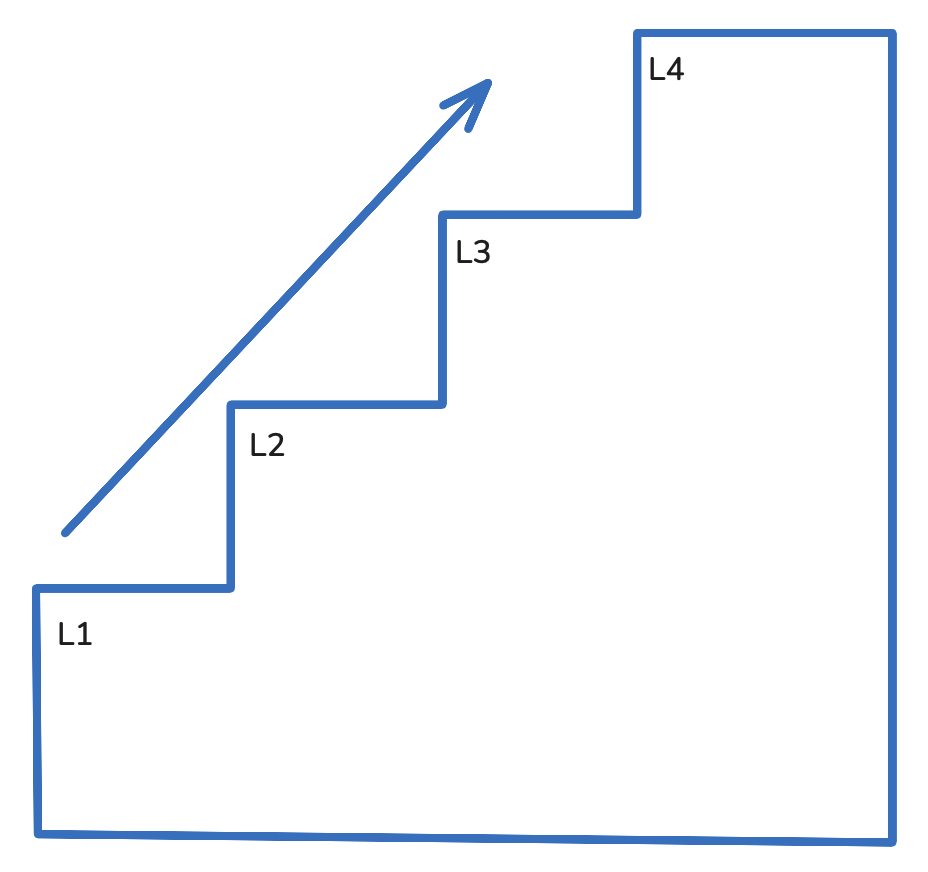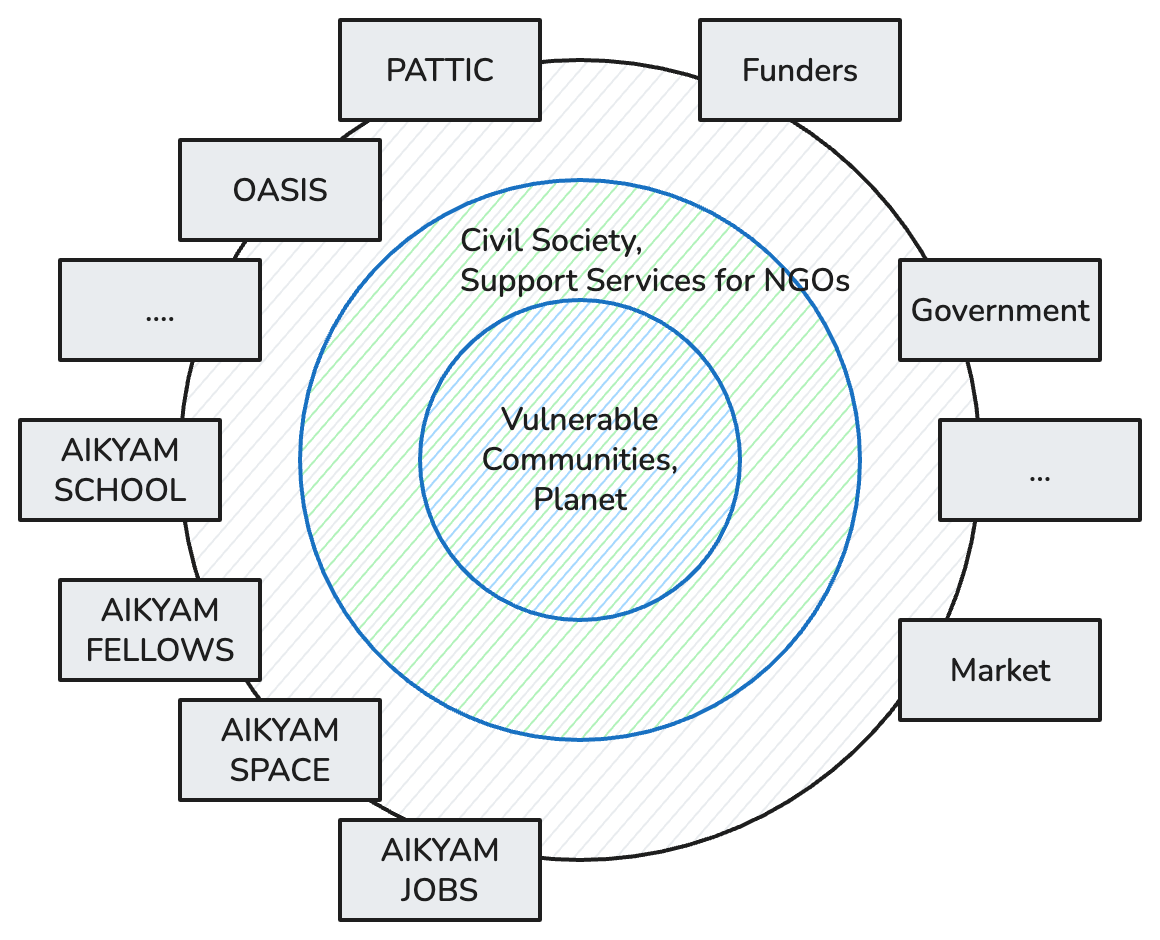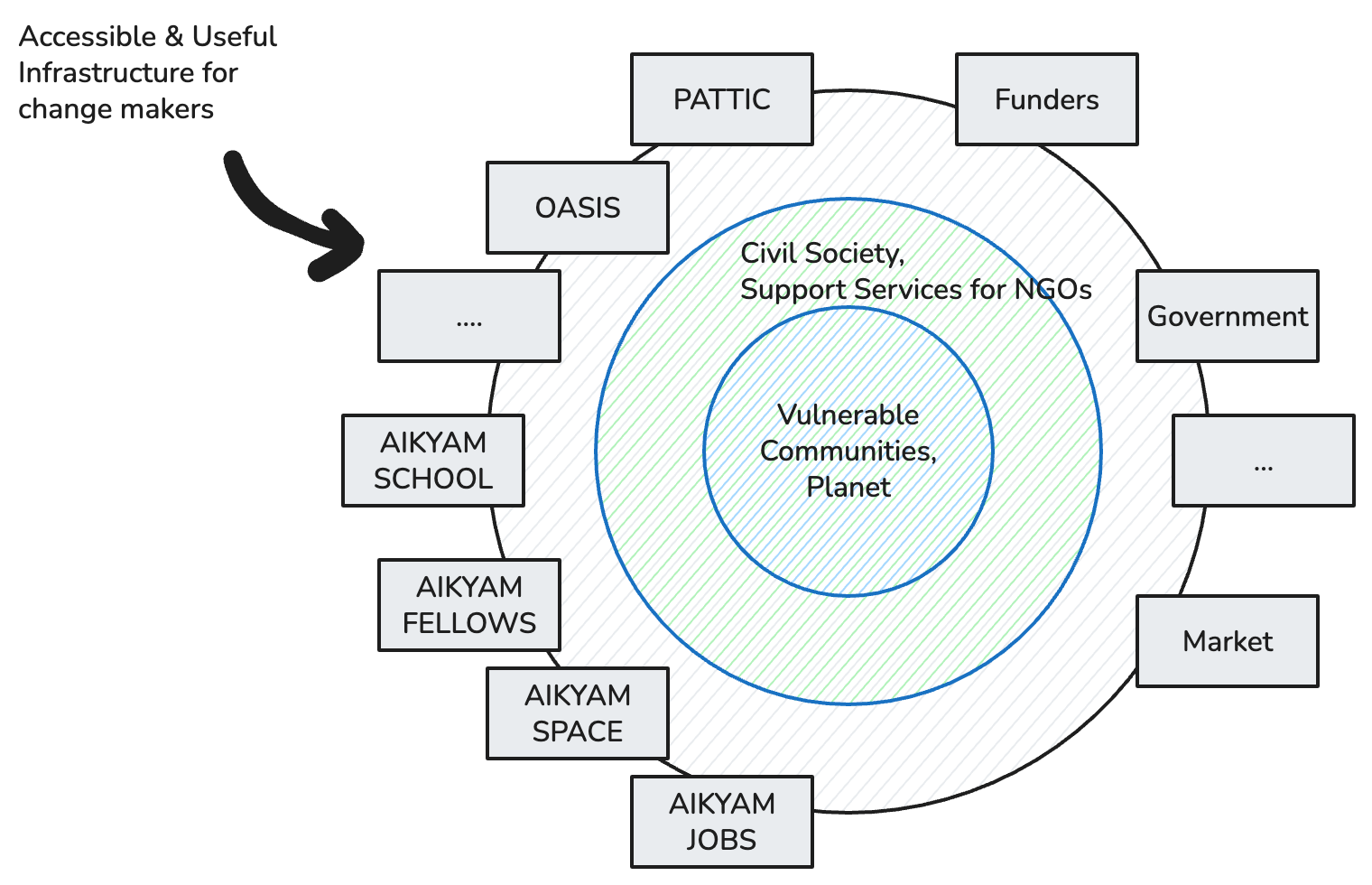aikyam fund - Making resilience accessible to early stage NGOs, ideas & at risk NGOs
Making resilience accessible to early stage NGOs & at risk NGOs
Abundance of good people doing great work...
- Right to information(RTI), Forest Rights
Act - FRA,Act, Protection of Children from sexual Offences(POCSO)Act, Juvenile Justice Act, Right to Education,Internet Freedom,Digital Personal Protection Act, 2023(DPDP Act) are a reality because of Civil Society efforts inIndia.India JustIndians10areyearsgivingago - 15L-20L Active For Impact , Not For Loss orgs(NGOs) (~130-150NGOs/1L Citizens)Donations have increased.more. Private philanthropy at 1.3 lakh crore in FY24 (1.05 lakh crore in FY22)even with FCRA Inputs reducing.- More
Talent studying,Students preparing to work in the Social Sector(through universities like APU, TISS, APUs,IRMA,etc)
But, there is scarcity of resilience in Civil Society Organisations
- Only 4.1L active NGOs (July 2025) are listed on DARPAN. The ratio of NGOs to citizens
in Indiais approximately 28 NGOs per 1L citizens, compared to 186 in Brazil, 64 in China, and 200 in Russia. IndianItsTrustsnot&justFoundationstheestimatenumbers but also the effectiveness too. Its estimated that number of fundable effective (>1 Cr/year) organisations in India could be less than 4000.- 6/10 early-stage NGOs do not get funding due to challenges with capacity around compliances, outreach.
- 3/10 mid sized NGOs do not get repeat funding from trusts and foundations due to capacity and systems around compliance challenges, program delivery and monitoring frameworks.
- 5/10 NGOs (all sizes, stages) have less than 3-month cash runway.
- 8/10 NGOs (all sizes, stages) struggle to obtain indirect costs funding (capacity building, technology, operational infrastructure, team building) leading to organisation stunting
What do we mean by 'resilience'?
A resilient NGO is one that survives disruptions and keeps serving the vulnerable communities they work with.
Let's imagine two NGOs lose their main funding.
- The non-resilient one closes in 2-3 months - NGO can't pay rent, team quits, programs for vulnerable communities abandoned.
- The resilient one tap their other funding streams, use their 6-month cash reserve, team takes temporary pay cuts but stays because they trust leadership. programs for vulnerable communities continue.
Unpacking
Organizational Componentschallenges aren't isolated problems - they're symptoms of resilienceinterconnected forsystemic NGOsgaps
WorkingWe withobserved partner50 NGOs,NGOs wethat brokesurvived 5+ years versus 30 that shut down Resiliencewithin 3 years. We noticed that organizational challenges aren't isolated problems - they're symptoms of interconnected systemic gaps. A compliance failure often stems from team capacity issues & rapidly changing regulations. Fundraising struggles connect to its key components
4 Key interconnected components of Resilience | |
|
|
Importantcould be more components like Community trust, Government relationships, etc. We will continue to workobserve urgentlythese onwith improvingeach statecohort ofto Resilience of Civil Society Orgs
refine.
Below is a an estimation (Desk research, Inputs from 80 NGOs) of the maturity level across each of the key components of resilienceresilience.
This is based on a set of 100 Ideas/NGOs that we have worked with at various levels.

TEST: Tiny Experiments for Social Transformation as a way to finding practical solutions
We didn't have many of the answers to improve the above metrics so we ran 200+ Tiny Experiments with partner NGOs to solve for parts of the above challengeschallenges. We succeeded in some and failed in many but we learnt from each experiment. TEST.
One of our objectives was to understand the key barriers in increasing maturity levels across various components of resilence (e.g Website is not a tech challenge but a storytelling challenge, ERPs are not a tech challenge but a Internal Policies, Training Challenge, Firing is a hiring problem, etc)
| Problem & Barrier | Tiny Experiment | Learnings |
|
|
A |
Workshops around Listening, Appreciative Inquiry, Shared Values, Imagine the Future on a regular basis in psychologically safe spaces helps towards mission aligned teams. |
| An online Free library of curated resources on Compliance accessible in 14 Indian Languages with AI podcasts |
Finance teams from NGOs across
Resources are just a start. We need to work on better ways to hold space for them by doing regular webinars. |
|
| Challenges around learning to ask for help among Civil Society Organisaions team members. | An online forum for NGO team members to ask questions co created by aikyam, RNPF, Saathi |
Questions through Email & Whatsapp easier to collect, Anonymous posting of Questions with Answers around sensitive topics helpful, Language Translate made discussions more accessible.
NGOs were cautious to ask questions publicly as it might affect them.
We need to work to solve for challenges faced by Users to "frame the question" |
| aikyam fellows did In person campaigns with gig workers in bangalore to share an online Free library of curated Acts with NotebookLM Video Audio summary and translations in 14 Indian Languages |
Native Language Video Summaries uploaded on Youtube very helpful to gig workers, Stickers with QR Codes to access the
We did not think through Grievance Redressal workflows |
|
| Funders, Technology and NGO Leadership has more agency in design of programs for vulnerable communities but are least affected if their design fails | In Person and online Vulnerability Centered Program Design workshop with a partner NGOs
Details 🔗 |
Unlike human centered designs - this framework gives more agency to Vulnerable communities/Planet in the solution of the design. Systems Thinking made it easier to identify Measurement and Evaluation Metrics in a more systemic way. Better Fundraising Slide Deck and Ask to Funders |
| We ran aikyam space a 12 bed stay and workshop space in Kochi and Carefully curated Workshops, bootcamps to bring together like minded folks from CSOs to solve urgent and important problems faced by the teams. | Increased sense of psychological safety, Felt safer to ask for help, Better mission aligned teams, Being away from the day to day field work for a few days in carefully curated workshops provided opportunities to reflect and course correct. | |
NGO A helped 1,000 children. Their website says 'We do education.' and a donate link that no one clicked.
NGO B with 100 children raised ₹10L in crowdfunding with story of |
Make Zero Code Free & Open Source Tools and Storytelling Frameworks more accessible to 20 NGOs through hands on workshops |
Tech is only 2% of the Website Problem,
|
| Nurturing PATTIC - an alliance and an online community of finance practitioners members from across CSOs |
1800+ Active Members with 76% of them active in the last 30 days. Regular Emails, WhatsApp alerts on important changes. High open rates of above 50% on newsletters and a click rate of 12-14%.
We need to improve to make it more community led and increase membership. |
|
| aikyam jobs - Hand curated jobs from social impact orgs with rich job descriptions to attract talent |
SEO friendly content, Adding context about the organisation within the job description, clear salary ranges and an option for NGOs to track applications became valuable to NGOs and job applicants.
We failed at building community of volunteers to add job posts, increase outreach to univeristy placement cells. We are working to improve this. |
|
| A Tech System to manage & track all Operations within an NGO to improve compliance and efficiency | Worked with an NGO to move them from paper based to ERPNext for their day to day operations. | We Failed and this affected the NGO and us. Policies needed to set up HR workflows were not ready, Employee data was not collated at one place, Leadership was not involved in the implementation and it was delegated. Program teams did not understand why this system was needed. |
..and more.
This approach by running experiments on actual problems and creating live solutions with feedback helped us to create a first draft framework for solving this in a systematic way for our partner NGOs/Ideas/projects.
aikyam fund aspires to Make resilience accessible to early stage NGOs, ideas & at risk NGOs
At aikyam fund we believe that organizational challenges aren't isolated problems - they're symptoms of interconnected systemic gaps. A compliance failure often stems from team capacity issues. Fundraising struggles connect to storytelling and program design weaknesses. Team burnout links to operational inefficiencies and unclear mission alignment.
Every year, We identify a cohort of early stage social impact Ideas, non profits & at risk non profits in India working on urgent and Important challenges affecting vulnerable communities and the planet.
This cohort goes through our 12-month program of Hands on Bootcamps, Workshops, Mentoring that treats organizations/Ideas as complex adaptive systems, addressing four interconnected components simultaneously:
- Compliant & Efficient Operations
- Psychologically Safe Workspaces & Teams
- Measurable, Impactful Programs
- Diverse, Predictable Fundraising Streams
To set them up for success, We define resilience across these four interconnected components and use a systematic L0→L1→L2→L3→L4 progression framework. The table below shows this level by level approach and the benefits unpacked at each Level in each key component.

Image: From L1 to L4: Participating NGOs are able to unpack benefits at each level.
| Level > | L1 | L2 | L3 | L4 |
| Compliance & Operations |
Regulatory Foundations Complete
12A, 80G, DARPAN, Audits, Statutory Filings, Banking, PAN |
Core Policies Implemented
Team trained on HR, Procurement, Travel, Expense Claims policies. PoSH ICC Committee formed. Data Privacy, Financial Procedures manual and Monthly reporting |
Tech Systems Integrated
Accounting, Fit for purpose ERP, Compliance Calendars, Quarterly internal audits, SOPs for key processes |
Compliance & Efficiency Optimized
Zero compliance violations, tech systems and SOPs adoption rate >80%, cost per beneficiary optimized, Mentoring other CSOs |
| Psychologically Safe Workspaces, Teams |
Leadership framework Established
Vision, Mission, Values Statements, Board, Founding team roles, Hiring process, First hirings |
Team Development Active
Onboarding, induction process in place, Team Building and capacity building plans created and first sessions started |
Collaboration Systems ready
Communications platforms, project management tools, knowledge management tools, regular knowledge sharing sessions) |
Psychologically Safety achieved in Workspace
Team recommends org to others, <15% annual attrition, mental health support available to staff, Innovation time/support for new ideas by team, sharing best practices with others in the ecosystem |
| Measurable, Impactful Programs |
Program Design co-created with agency to communities they work with.
Identify stakeholders, their needs & vulnerabilities, barriers to those needs, solution, feedback loops. |
Community driven Monitoring System Operational
Program workflows mapped, output indicators tracked, outcome indicators defined with baseline, program review rhythm established with community |
Program Monitoring Active with monthly feedback from community
Mid course corrections, annual impact assessment, feedback loops with communities at risk |
Impactful Programs delivery demonstrated
Replicable program models that are recommended or adopted by others working on similar challenges, providing support to others replicating/improving the model |
| Diverse, Predictable fundraising streams |
Story & Impact Framework Ready
Why they exist, what they do, Theory of Change, 3-5 impact case studies, basic website, A basic clear communication deck/document |
Outreach Plan Active
Fundraising plan in place, Donor lists, engagements, key fundraising opportunities identified, 1-3 Funding proposals submitted, Individual Giving started with 30-50 regular givers |
Diverse streams of fundraising active
Individual giving CRM, 1-2 CSR/Trust Partnerships established, Grant Management systems, Active Website, Engagement with stakeholders through newsletters, events |
Financial Resilience Achieved
6+ months cash flow reserves, Revenue streams diversifed with no source more than 40% of total annual income, multi year grants secured (1-2), Individual Giving retention >60% |
We also support select Ideas, NGOs by covering costs (Around INR 5L-15L)10L) to implement recommendations during the above programme. (This could include cost of expert consultant on compliance, facilitation, logistics, Financial Support for Founders if no income source, etc). These costs are directly paid to the Service providers, consultants, interns and not to the NGO.
The program also provides Office hours with aikyam fellows, alumni and Conversations and mentoring with other Founders, Frontline workers, Teams
Building alliances and freeaccessible infrastructure, resources that can benefit Civil Society as an Ecosystem
Eco-system approach by nurturing/co-creating an eco-system of "infrastructure" for NGOs through public resources/projects/alliances like:
We are a Small but Committed team with expertise and experience of solving problems faced by Civil Society Organisations
Key team members
- Shemeer Babu is aikyam fellow and Co-founder providing leadership and implementation support to the team
- Jinso Raj is aikyam fellow and helps make Free & open Source tech more accessible to CSOs
- Sumi Thomas is aikyam fellow and helps make storytelling tools more accessible to Changemakers
- Pooja Thyagi is aikyam fellow and runs PATTIC that makes regulatory compliances more accessible to CSOs
- Minah Jalal is aikyam fellow and runs aikyam space to make psychologically safe spaces accessible to change makers.
- Femina Fathima is aikyam fellow and helps make benefits of design more accessible to changemakers
Note: Alumni from our programs are valuable part of our extended team.
We have raised INR 3.5 Cr out of INR 10.3 Cr needed to support 45-55 Ideas/NGOs in India in 3 Years
| S No | Description | Funding |
Y1 |
Y2 |
Y3 |
| 1 | People (Fellowships, Salaries, Consulting, Interns) | ₹67,20,000 | ₹69,88,800 | ₹72,68,352 | |
| 2 | IT Infra for NGOs (Hosting, Laptops, Devices) | ₹17,50,000 | ₹18,20,000 | ₹18,92,800 | |
| 3 | IT Consulting for NGOs (Customisations of FOSS) | ₹7,00,000 | ₹7,28,000 | ₹7,57,120 | |
| 4 | Office/Space (Rent, Utilities, Medical, Facilities) | ₹28,00,000 | ₹29,12,000 | ₹30,28,480 | |
| 5 | Space (Furniture, Fixtures, Maintenance) | ₹3,50,000 | ₹3,00,000 | ₹3,00,000 | |
| 6 | Legal & Compliances | ₹2,50,000 | ₹2,60,000 | ₹2,70,400 | |
| 7 | Total Aikyam Operating Costs (1 to 6) | 65% Funded | ₹1,25,70,000 | ₹1,30,08,800 | ₹1,35,17,152 |
| 8 | Support for Ideas/NGOs 15 in Y1, 15 in Y2 & 20 in Y3 ~ 6.4 Cr INR for 3 years = Total 50 Ideas/NGOs | 15% Funded | ₹1,82,20,000 | ₹1,89,48,800 | ₹2,67,58,784 |
Note:
- Year on Year Inflation at 4%,
- aikyam operating costs are optimised/capped in Y1 and Y2 by leveraging on public infrastructure, support that we are a part of (like PATTIC, OASIS, etc) and support/mentoring by alumni as a way of paying it forward
What is INR 10L Support for Ideas/NGOs? (#8 in table above)
WeAll defineNGOs, resilienceespecially acrossearly fourstage interconnectedneed componentsfinancial andsupport use(Expert aadvice, systematicTravel, Administration, basic sustenance for founders, emergency funds) as they go through L0→L1→L2→L3→L4 progression framework.framework - Not all NGOs will advance through every level - progression depends on organizational readiness, capacity, and specific needs. Some may graduate early, others require extended support at certain levels.
Investment for a cohort of 10 NGOs/Ideas : ₹1,08,20,000 for 1 year (average across varied NGO development stages). Breakdown is shared in below table.
|
Levels > |
L0–L1 |
L1–L2 |
L2–L3 |
L3–L4 |
|---|---|---|---|---|
|
# of Partners |
10 |
10 |
~6 |
~5 |
|
Compliance & Operations |
₹50,000 –
Regulatory Foundations Complete |
₹60,000
Core Policies Implemented |
₹90,000
Tech Systems Integrated |
₹90,000
Compliance & Efficiency Optimized |
|
Psychologically Safe Workspaces |
₹50,000
Leadership framework Established |
₹60,000
Team Development Active |
₹70,000
Collaboration Systems ready |
₹1,00,000
Psychologically Safety achieved |
|
Measurable, Impactful Programs |
₹80,000
Program Design co-created |
₹1,00,000
Monitoring System Operational |
₹1,60,000
Monitoring with feedback |
₹1,70,000
Impactful delivery demonstrated |
|
Fundraising Streams |
₹1,00,000
Story & Impact Framework Ready |
₹1,00,000
Outreach Plan Active |
₹1,00,000
Fundraising streams active |
₹1,00,000
Financial Resilience Achieved |
|
Per NGO per Stage |
₹2,80,000
NGO reaches L1 across 4 key components |
₹3,20,000
NGO reaches L2 across 4 key components |
₹4,20,000
NGO reaches L3 across 4 key components |
₹4,60,000
NGO reaches L4i8 across 4 key components |
High Level Financial Projection [Draft]
Selection Criteria for NGOs/Ideas (Draft)
- Founder(s) should be working full time on the project/Idea
- Should be registered or in the process of being registered as a Not For Profit Entity in India
- Work should be in India
- We are currently focusing only on Non FCRA Entities.
References for Due Diligence, Impact Stories
- Nasmina of iLab India | info@ilabindia.org
- Rohit Sharma for Awaaz Leadership Labs | rohitsharma@nujs.edu
- Hassan Al Banna from Parivartan | contact.albanna@gmail.com
- Anjali from Thudippu | anjali.thudippu@gmail.com
- Pranav from OASIS | pranav@oasishq.org
- Sharad from PATTIC | sharadbhargava@saathidevelopment.org
Grant Request of INR 3-5 Cr for 3 years from Trusts & Foundations in India
A total of INR 3-5 Cr in 3 tranches as a support/fund for around 25-45 NGOs/Ideas over 3 years (September 2025 - August 2028)
For any queries, interest in funding us, please write to shemeer@aikyamhq.com
We are a Sec 8 Non Profit - Compliance Documentations
Note: NO FCRA
Company Registration
- List of Directors.pdf
- AoA.pdf
- CERTIFICATE OF INCORPORATION T4G.PDF
- PAN_T4G.pdf
- License for Section 8 of Companies Act.PDF
- MoA.pdf
- Darpan_Registration.pdf
12A & 80G
CSR Registration
Audit Reports
Income Tax Returns
- FY 2022-23
- FY 2023-24
Annual Reports
Policies


